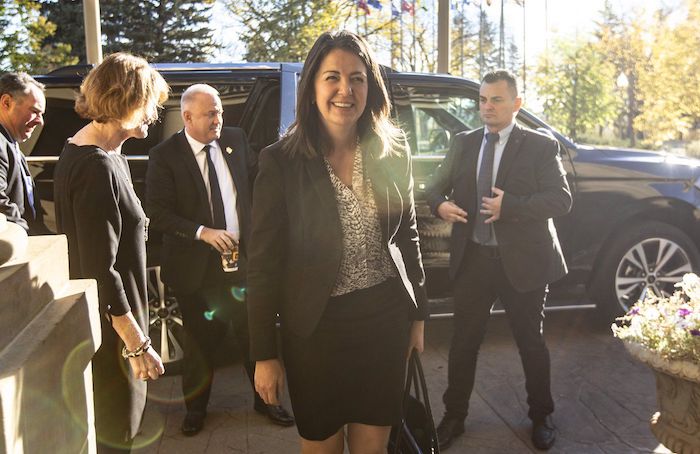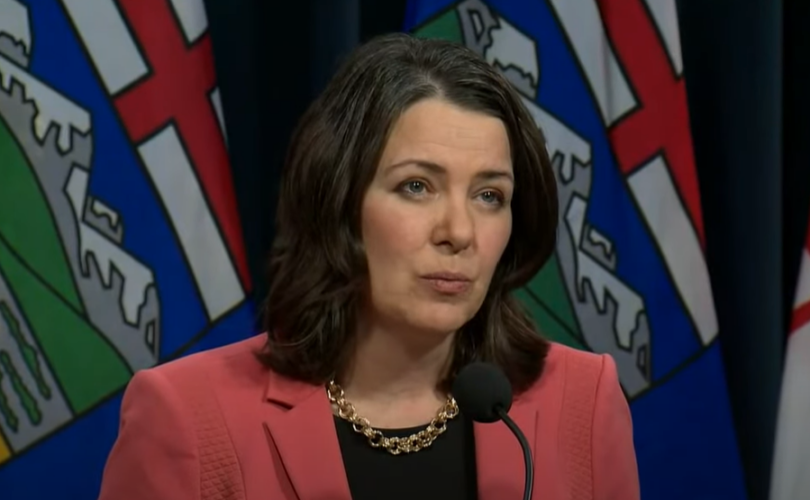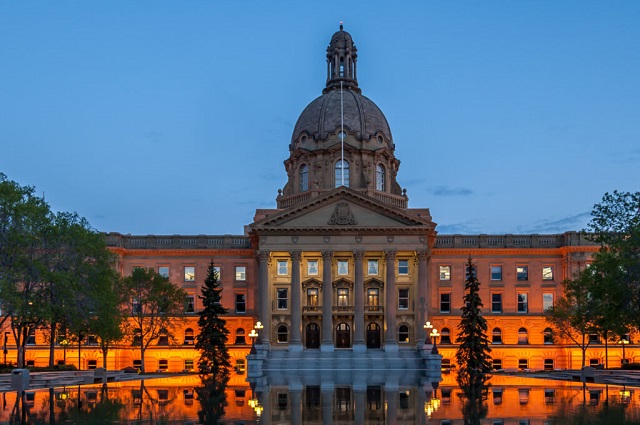Alberta
Premier Smith keeps foes in cabinet posts. Red Deer’s Adriana LaGrange remains Education Minister

Premier announces new cabinet
Alberta’s Premier has announced her new cabinet, with a focus on ensuring Albertans’ interests and priorities are well represented.
Twenty-four members of the Government of Alberta’s cabinet are being introduced to Albertans in advance of their taking the oath of office.
The new cabinet represents a strong mix of rural and urban MLAs from every geographic region of the province, each of whom the Premier recognizes as a strong advocate for their community and province. They are committed to standing up for Albertans, growing our economy and addressing affordability.
Joining the Premier and Minister of Intergovernmental Affairs in cabinet are:
- Deputy Premier and Minister of Skilled Trades and Professions – Kaycee Madu
- Deputy Premier and Minister of Infrastructure – Nathan Neudorf
- President of Treasury Board and Minister of Finance – Travis Toews
- Minister of Jobs, Economy and Northern Development – Brian Jean
- Minister of Justice – Tyler Shandro
- Minister of Health – Jason Copping
- Minister of Energy – Pete Guthrie
- Minister of Environment and Protected Areas – Sonya Savage
- Minister of Technology and Innovation – Nate Glubish
- Minister of Affordability and Utilities – Matt Jones
- Minister of Municipal Affairs – Rebecca Schulz
- Minister of Transportation and Economic Corridors – Devin Dreeshen
- Minister of Public Safety – Mike Ellis
- Minister of Agriculture and Irrigation – Nate Horner
- Minister of Forestry, Parks and Tourism – Todd Loewen
- Minister of Trade, Immigration and Multiculturalism – Rajan Sawhney
- Minister of Education – Adriana LaGrange
- Minister of Advanced Education – Demetrios Nicolaides
- Minister of Service Alberta and Red Tape Reduction – Dale Nally
- Minister of Indigenous Relations – Rick Wilson
- Minister of Seniors, Community and Social Services – Jeremy Nixon
- Minister of Children’s Services – Mickey Amery
- Minister of Mental Health and Addictions – Nicholas Milliken
- Minister of Culture – Jason Luan
“I am thrilled to being working with this strong, determined, united group of MLAs. Alberta’s future is bright – but there’s a lot of work to be done. Our team will work every day to gain your trust, make bold changes and continue to build the most innovative, entrepreneurial and welcoming province in the world. I want to thank our entire team for their tireless dedication to Albertans and we’re looking forward to the days ahead.”
Caucus leadership positions will include:
- Whip (Minister without portfolio) – Brad Rutherford
- House Leader (Minister without portfolio) – Joseph Schow
- Deputy House Leaders – Kaycee Madu, Mickey Amery, David Hanson
Ministers will be assisted in their work by the following parliamentary secretaries:
- Parliamentary Secretary for Ukrainian Refugee Settlement – Jackie Armstrong-Homeniuk
- Parliamentary Secretary for EMS Reform – RJ Sigurdson
- Parliamentary Secretary for Rural Health – Tany Yao
- Parliamentary Secretary for Economic Corridors – Shane Getson
- Parliamentary Secretary for Tourism – Miranda Rosin
- Parliamentary Secretary for Agrifood Development – Glenn van Dijken
- Parliamentary Secretary for Multiculturalism – Devinder Toor
- Parliamentary Secretary for Status of Women – Tanya Fir
- Parliamentary Secretary for Community Outreach – Muhammad Yaseen
- Parliamentary Secretary for Procurement Transformation – David Hanson
- Parliamentary Secretary for Small Business – Martin Long
New government committees will be chaired by:
- Economy and Affordability Cabinet Policy Committee – Jason Nixon
- Alberta First Cabinet Policy Committee – Garth Rowswell
- Social Services Cabinet Policy Committee – Searle Turton
- Building Communities Cabinet Policy Committee – Pat Rehn
- Legislative Review Committee Chair – Jason Stephan
Treasury Board members will include:
- Travis Toews
- Matt Jones
- Nate Glubish
- Rebecca Schulz
- Devin Dreeshen
- Jordan Walker
- Rick Wilson
- Nathan Neudorf
- Pete Guthrie
Cabinet members will be sworn in on the morning of Monday, Oct. 24 at 11 a.m. and will then begin receiving briefings from their departments.
Alberta
Alberta government should eliminate corporate welfare to generate benefits for Albertans

From the Fraser Institute
By Spencer Gudewill and Tegan Hill
Last November, Premier Danielle Smith announced that her government will give up to $1.8 billion in subsidies to Dow Chemicals, which plans to expand a petrochemical project northeast of Edmonton. In other words, $1.8 billion in corporate welfare.
And this is just one example of corporate welfare paid for by Albertans.
According to a recent study published by the Fraser Institute, from 2007 to 2021, the latest year of available data, the Alberta government spent $31.0 billion (inflation-adjusted) on subsidies (a.k.a. corporate welfare) to select firms and businesses, purportedly to help Albertans. And this number excludes other forms of government handouts such as loan guarantees, direct investment and regulatory or tax privileges for particular firms and industries. So the total cost of corporate welfare in Alberta is likely much higher.
Why should Albertans care?
First off, there’s little evidence that corporate welfare generates widespread economic growth or jobs. In fact, evidence suggests the contrary—that subsidies result in a net loss to the economy by shifting resources to less productive sectors or locations (what economists call the “substitution effect”) and/or by keeping businesses alive that are otherwise economically unviable (i.e. “zombie companies”). This misallocation of resources leads to a less efficient, less productive and less prosperous Alberta.
And there are other costs to corporate welfare.
For example, between 2007 and 2019 (the latest year of pre-COVID data), every year on average the Alberta government spent 35 cents (out of every dollar of business income tax revenue it collected) on corporate welfare. Given that workers bear the burden of more than half of any business income tax indirectly through lower wages, if the government reduced business income taxes rather than spend money on corporate welfare, workers could benefit.
Moreover, Premier Smith failed in last month’s provincial budget to provide promised personal income tax relief and create a lower tax bracket for incomes below $60,000 to provide $760 in annual savings for Albertans (on average). But in 2019, after adjusting for inflation, the Alberta government spent $2.4 billion on corporate welfare—equivalent to $1,034 per tax filer. Clearly, instead of subsidizing select businesses, the Smith government could have kept its promise to lower personal income taxes.
Finally, there’s the Heritage Fund, which the Alberta government created almost 50 years ago to save a share of the province’s resource wealth for the future.
In her 2024 budget, Premier Smith earmarked $2.0 billion for the Heritage Fund this fiscal year—almost the exact amount spent on corporate welfare each year (on average) between 2007 and 2019. Put another way, the Alberta government could save twice as much in the Heritage Fund in 2024/25 if it ended corporate welfare, which would help Premier Smith keep her promise to build up the Heritage Fund to between $250 billion and $400 billion by 2050.
By eliminating corporate welfare, the Smith government can create fiscal room to reduce personal and business income taxes, or save more in the Heritage Fund. Any of these options will benefit Albertans far more than wasteful billion-dollar subsidies to favoured firms.
Authors:
Alberta
Official statement from Premier Danielle Smith and Energy Minister Brian Jean on the start-up of the Trans Mountain Pipeline

-

 Addictions1 day ago
Addictions1 day agoCity of Toronto asks Trudeau gov’t to decriminalize hard drugs despite policy’s failure in BC
-

 Business1 day ago
Business1 day agoWhen politicians gamble, taxpayers lose
-

 Automotive1 day ago
Automotive1 day agoVehicle monitoring software could soon use ‘kill switch’ under the guise of ‘safety’
-

 Economy2 days ago
Economy2 days agoYoung Canadians are putting off having a family due to rising cost of living, survey finds
-

 Alberta2 days ago
Alberta2 days agoProtecting the right to vote for Canadian citizens: Minister McIver
-

 Great Reset2 days ago
Great Reset2 days agoMiddle school girls who refused to compete against male banned from next track meet
-

 COVID-192 days ago
COVID-192 days agoCanada’s COVID vaccine injury program has paid out just 6% of claims so far
-

 Environment2 days ago
Environment2 days agoClimate Alarmists Want To Fight The Sun. What Could Possibly Go Wrong?









